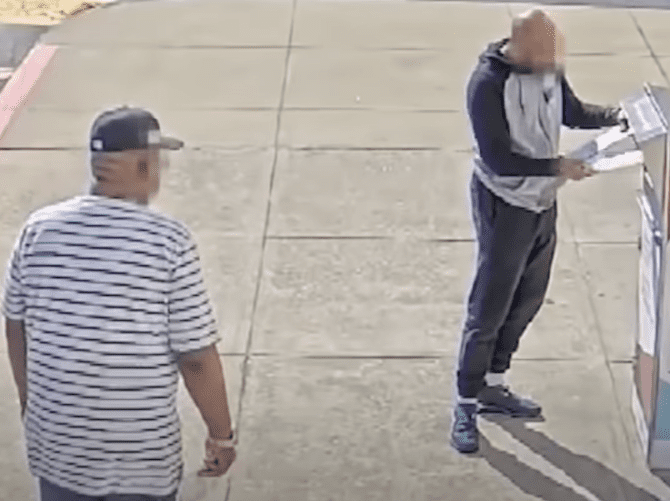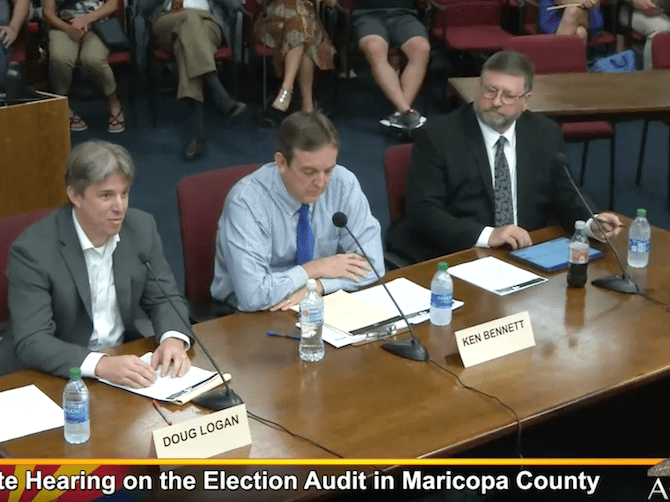Cyber Ninjas Admit Biden Won, But Report Revives ‘Election Fraud’ Conspiracies

(Trump supporters await Cyber Ninjas’ report outside Arizona Senate. Photo by Steven Rosenfeld)
Ten months after the 2020 presidential election, the pro-Trump contractors hired by the Arizona state Senate’s Republican not only failed to prove that the election was stolen but said that Joe Biden won by a wider margin than had been previously reported, according to their review of election records in Maricopa County, home to most Arizona voters.
While the county totals show Biden winning by 45,109 votes, the Cyber Ninjas’ hand recount found that Biden won by 45,469 votes. (Biden beat Trump by 10,457 votes in the official 2020 statewide results.) Despite the unexpected affirmation of the accuracy of Maricopa County’s voting system, however, other parts of the Cyber Ninjas’ report reiterated previous conspiratorial claims.
The report insinuates that tens of thousands of voter registrations and paper ballots might have been illegitimate, forged, or even illegal. The evidence cited for those claims, however, was quickly debunked by a team of experienced election auditors who obtained a draft copy of the report from Voting Booth, which also contributed to their critique of the Cyber Ninjas assertions.
Cyber Ninjas’ attacks on voter registrations, for example, were based on imprecise commercial data, not on the government records used in elections. The forged ballots accusation indicated that Cyber Ninjas didn’t know that ballots are printed for voters after they arrive at vote centers on Election Day. Under a microscope, the lines on those ballots appear less crisp than the lines that appear on mailed-out ballots, which are printed by an industrial press weeks ahead of an election.
“The Ninja’s long-awaited report on their ‘forensic audit’ is dead on arrival,” wrote Larry Moore, the retired CEO of a federally certified election audit firm who worked on the analysis that rebutted the report. “They have made claims on ballot and vote counts which cannot be verified and claims on voter participation based on a commercial database wholly unsuited for elections.”
Nonetheless, the Cyber Ninjas included recommendations for legislative action that are consistent with decades of GOP efforts to put partisan constrictions on voting and intimidate Democratic Party voters, based on clichéd false claims of fraudulent voting .
In addition to recommending that Arizona pass legislation to authorize private contractors like the report’s authors to investigate elections, the report said those partisan contractors should use commercial data as the basis for purging registered voters 30 days before an election. If enacted, that policy would leave unsuspecting voters unable to cast a ballot that would be counted (as Arizona’s voter registration deadline is 29 days before an election). That recommendation also clashes with the National Voter Registration Act of 1993, a federal law that bars delisting voters within 90 days ahead of an election.
The totality of the report’s contents, following the Cyber Ninjas’ error-filled review conducted over the past five months, suggest that nothing they will report to the Arizona Senate on Friday afternoon should be used as a basis for legislation, or to launch a new industry targeting unpopular election results.
But leaving aside the arcane details of election administration, the report’s topline takeaway—that Trump lost Arizona— is a serious blow to pro-Trump Republicans who have worked for months to delegitimize Biden and had been hoping to export Arizona-style audits to other states.
“Their count validates the official results, even if the particulars [of their analysis] are dubious,” said Chris Sautter, an election recount lawyer who has represented Democrats for decades. “They could not come up with [vote count] numbers that demonstrated a substantial swing one way or the other.”
“It is important to see that every time Trump and his supporters have been given a forum to prove this case, they have failed,” said Ben Ginsberg, an election lawyer who has represented Republicans for decades. “If they can’t prove it in Arizona with the way these proceedings have been conducted, then they’re really not going to be able to prove it anywhere.”
Covering Up Their Mistakes
The contractors’ unfamiliarity with the nuances of running elections emerged repeatedly as an issue, ever since the Cyber Ninjas’ team started hand-counting 2.1 million paper ballots last April. Despite their insistence that they know more about running elections than career government election officials, they are not the experts they have repeatedly claimed to be.
For the past 10 months, the leaders of the pro-Trump “Stop the Steal” movement, their allies in state legislatures in battleground states, and the team assembled by Cyber Ninjas have tried to find proof that Biden did not legitimately win Arizona. Before these contractors were hired by Arizona’s Senate Republicans, many stated on social media that they believed the presidential election was stolen. Arizona Senate President Karen Fann gave the contractors everything that they wanted, from subpoenas of Maricopa County’s voting machines and records to repeated extensions of their deadline.
What unfolded between late April and mid-August was a pattern in which the Cyber Ninjas changed the review’s focus—moved the goal posts—in a vain attempt to conceal their inexperience as well as their awareness, based on hand-counting ballots, that Biden had legitimately won Maricopa County by a wide margin.
The early blunders are briefly noted in the draft report’s discussion of “quality controls.” The report said that “all [hand-written] Tally sheets originally aggregated in the first three weeks of counting were re-entered in the new forms.” Those sheets, which grew to more than 10,000 pages, had to be entered into an Excel spreadsheet at computer terminals. The report said overhead video cameras were used to catch data-entry typos. “The primary function of these cameras… would demonstrate irrefutable evidence that the data entered was accurate.”
Virtually every experienced election observer noted that that Cyber Ninjas’ process was imprecise in many respects, from counting ballot to data entry. Most important, the hand count was not designed to compare subtotals along the way with the building blocks of the officially certified results.
By late June, the Cyber Ninjas knew that the hand count’s results had differed from the official results by thousands of votes, Voting Booth was told at the time by insiders. The contractors never released the hand-count results, and throughout the summer, went to court to oppose releasing their records to the press.
In early July, the state Senate purchased machines to count the number of paper ballots—not their votes—as a way to try to understand what was wrong with the hand count. Until the presentation of their report on Friday, the contractors never discussed the machine count results either. Their draft report and attached data files contained no records of the hand count’s subtotals nor the machine count of the number of ballots.
Meanwhile, experienced outside auditors have been working for months to hold the Cyber Ninjas accountable—by releasing analyses of Maricopa County’s election based on the same election records that flummoxed the Cyber Ninjas. The outside auditors believe that the Cyber Ninjas panicked in late June, which was when they began a machine count of the number of ballots (not votes) in hope of finding new pro-Trump evidence. Instead, that tactic backfired as it confirmed the number of ballots and votes and left no room for speculation about Biden’s victory.
At that point, the Cyber Ninjas announced that they had to expand their investigation, which the Senate president allowed—and they revived the longstanding GOP strategy of attacking voter rolls, by alleging tens of thousands of illegitimate voters and thousands of forged ballots. These claims and their specious evidence, all debunked on the eve of the report’s release, involved volumes of votes larger than Biden’s margin of victory.
Above all, perhaps one statistic from the Cyber Ninjas’ draft report stands out as an indicator of their lack of expertise as election auditors. In the presidential election, they reported counting 2,088,569 ballots. In the U.S. Senate race they reported counting 2,088,396 ballots in the U.S. Senate race—a difference of 173 ballots. Both races were on the same paper ballot, meaning the figures don’t reconcile.
This is a basic auditing mistake; there should no difference in the number of ballots counted in the election.






